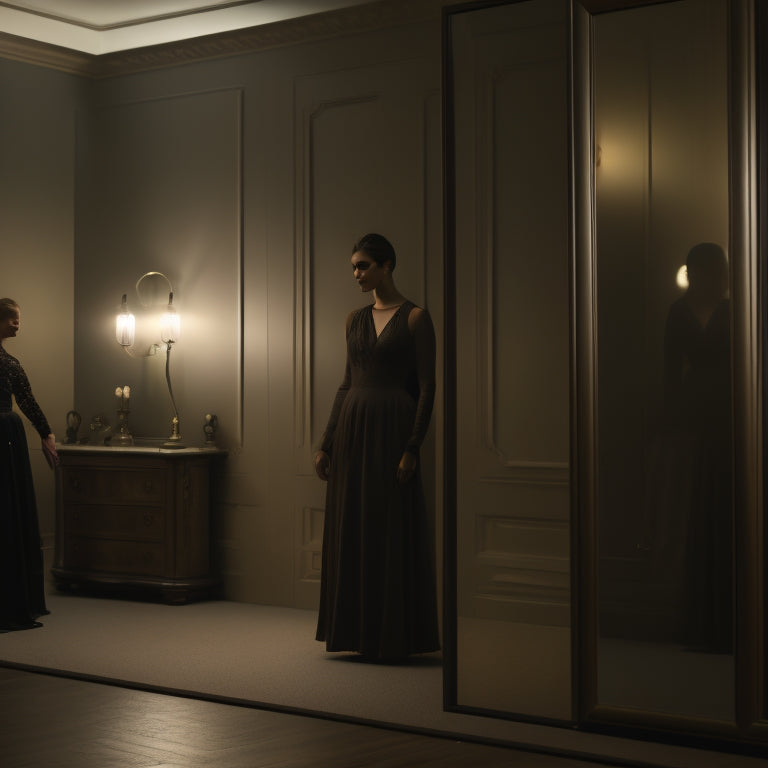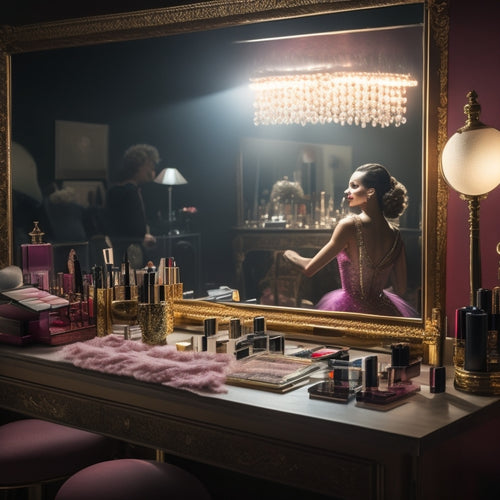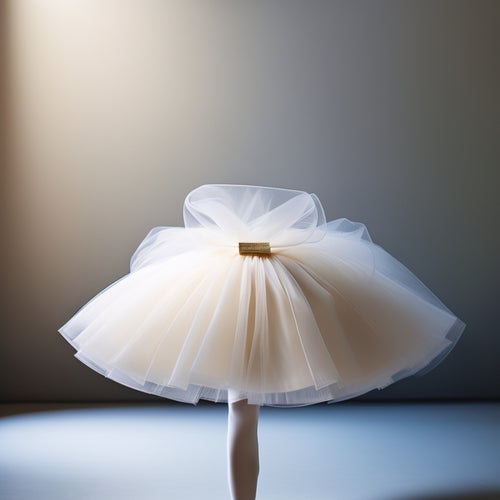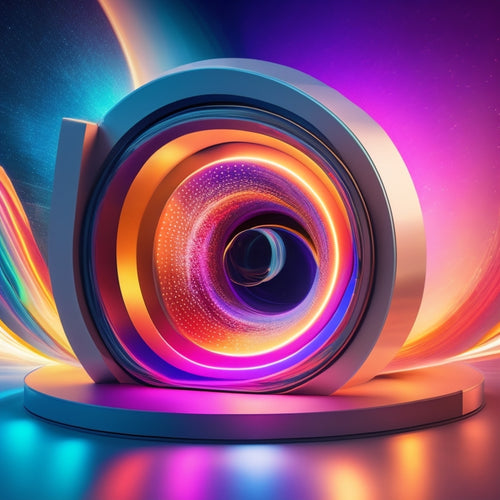
Are Full-Length Mirrors Accurate?
Share
When you stand in front of a full-length mirror, you assume you're seeing an accurate reflection of yourself, but the truth is that mirrors can be affected by various factors that influence their accuracy. While mirrors can provide an undistorted virtual image, minor distortions, manufacturing flaws, and lighting conditions can impact the reflection's accuracy. Even your brain's perception and bias can alter what you see. It's essential to recognize these influences to understand what you're really seeing in the mirror. As you explore the nuances of mirror reflections, you'll discover how these factors intersect to shape your reflection.
Key Takeaways
• Full-length mirrors can provide an accurate reflection, but minor distortions can occur due to manufacturing flaws or optical illusions.
• The law of reflection ensures that the angle of incidence equals the angle of reflection, allowing for an undistorted virtual image.
• High-quality mirrors with silver coatings can minimize distortions, but even they can have imperfections affecting reflection accuracy.
• Lighting conditions significantly influence reflection accuracy, with harsh shadows and glare distorting features and soft, warm lighting creating a flattering reflection.
• Human perception and cognitive bias can also affect how accurately we perceive our reflection, making it essential to cultivate a realistic and compassionate relationship with our body.
The Science of Mirror Reflection
When you stand in front of a full-length mirror, the mirror's reflective surface aligns with your body's spatial orientation, allowing the mirror to project an undistorted, virtual image of yourself back at you. This precise reflection is made possible by the mirror's silver coatings, which guarantee a high level of reflectivity.
The angle at which light hits the mirror also plays an essential role, as the law of reflection states that the angle of incidence equals the angle of reflection. With a full-length mirror, the reflection angles are ideal, allowing you to see yourself from head to toe without distortion.
As you gaze into the mirror, you can trust that the image staring back is an accurate representation of your physical self.
Optical Illusions and Distortions
As you gaze into the mirror, you may occasionally notice minor distortions or optical illusions that can affect the accuracy of your reflection. Curved reflections, for instance, can create a subtle magnification effect, making your body appear slightly larger than it is.
Virtual images, on the other hand, can cause your reflection to appear slightly displaced or distorted. These optical illusions can be attributed to the way light behaves when it hits the mirror's surface. The curvature of the mirror, even if it's minimal, can bend light in unexpected ways, creating these distortions.
While these effects are typically minor, they can still impact the accuracy of your reflection. It's essential to be aware of these optical illusions to get an accurate perception of yourself.
Manufacturing Flaws and Inconsistencies
You may not realize that even high-quality mirrors can have imperfections introduced during the manufacturing process, which can compromise the accuracy of your reflection.
These imperfections can arise from material defects, such as impurities in the glass or uneven silver coating. Furthermore, quality control issues can lead to inconsistencies in the mirror's curvature, causing distortions in your reflection.
As a result, you may notice that your reflection appears warped or asymmetrical. It's essential to be aware of these potential flaws, as they can affect the accuracy of your mirror.
When selecting a mirror, look for manufacturers that prioritize quality control and use high-quality materials to minimize the risk of material defects.
The Impact of Lighting Conditions
Lighting conditions greatly influence the accuracy of your reflection, with harsh shadows and unflattering glare capable of distorting your features. This is because light affects how you perceive your appearance.
For instance, soft, warm lighting can create a more flattering reflection, while harsh, cool lighting can accentuate imperfections.
| Lighting Condition | Effect on Reflection |
| Warm White (2700K) | Soft, flattering, and forgiving |
| Cool White (5000K) | Neutral, accurate, and detailed |
| Natural Daylight | Harsh, revealing, and unforgiving |
| Dim Red (1800K) | Soft, warm, and relaxing |
Human Perception and Bias
Your brain's tendency to perceive what it expects to see, rather than what's actually reflected, can greatly skew your perception of your appearance. This cognitive bias, known as confirmation bias, can lead to a distorted body image and self-perception.
When you look in the mirror, you're not just seeing your physical reflection; you're also influenced by your past experiences, emotions, and expectations. This can cause you to focus on perceived flaws or imperfections, reinforcing negative self-talk and low self-esteem.
Be aware of your biases and try to separate your self-worth from your physical appearance. Recognize that your mirror reflection is only one aspect of your overall identity. By doing so, you can cultivate a more realistic and compassionate relationship with your body.
Frequently Asked Questions
Can I Trust the Reflection in a Funhouse Mirror?
When you gaze into a funhouse mirror, don't trust what you see - the curved glass creates optical illusions, warping your reflection into distorted reflections that deceive your eyes, playing tricks on your perception.
Are Antique Mirrors More Accurate Than Modern Ones?
You might assume antique mirrors are more accurate due to their vintage craftsmanship and historical materials, but surprisingly, modern manufacturing techniques often surpass traditional methods when it comes to precision and reflective accuracy.
Do Mirrors in Dressing Rooms Make Me Look Worse?
As you stand before the dressing room mirror, beware the Dressing Deception, where flattering lighting and cleverly angled reflections create a Retail Reality that can distort your self-perception, making you question your appearance, but it's not you, it's the mirror's manipulation.
Can I Use a Mirror to Check My Posture and Alignment?
You can utilize a mirror to check your posture and alignment by engaging your core, increasing body awareness, and making adjustments to achieve ideal spinal alignment, promoting a more confident and empowered you.
Are Smart Mirrors With Augmented Reality More Accurate?
"Like Narcissus gazing into the pool, you're drawn to the futuristic allure of smart mirrors with augmented reality. Offering Virtual Try On and Enhanced Reflection, they provide a more accurate representation of yourself, transcending traditional mirrors' limitations."
Related Posts
-

5 Essential Tips for Dance Makeup Artists Online
As a dance makeup artist, you know having a strong online presence is key to success. You need a professional website...
-

Dance Into Elegance: Black & White Ballet Art
Black and white ballet art epitomizes elegance, sophistication, and artistic expression, providing a timeless and ref...
-

Issuu's Dynamic Flipbook Creation: Engage & Share
Issuu's dynamic flipbook creation platform revolutionizes digital content creation, offering an intuitive and seamles...


